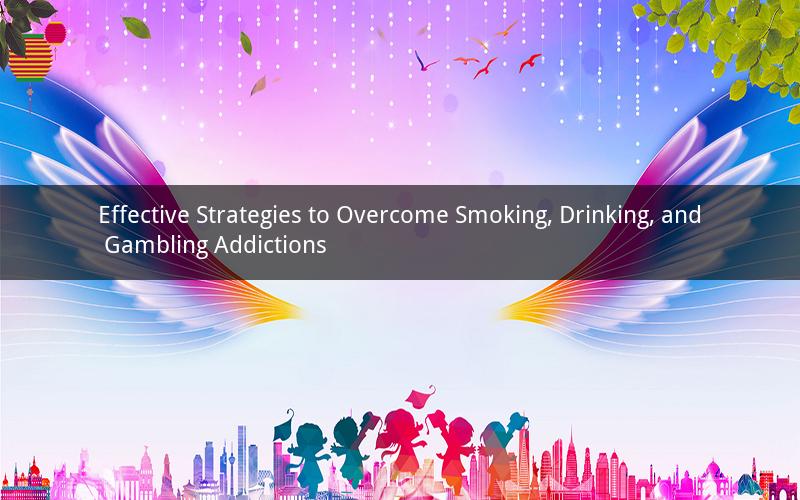
Introduction:
Addictions to smoking, drinking, and gambling can have severe consequences on one's health, relationships, and overall well-being. Quitting these habits can be challenging, but with the right strategies and support, it is possible to overcome them. In this article, we will explore effective methods to stop smoking, drinking, and gambling, providing you with valuable insights and tips to help you on your journey towards a healthier lifestyle.
1. Understanding the Addictions:
To effectively combat smoking, drinking, and gambling addictions, it is crucial to understand the underlying causes and triggers. Here are some key points to consider:
a. Smoking: Nicotine addiction is a primary factor that keeps smokers hooked. Understanding the physical and psychological effects of smoking can help in developing strategies to overcome this addiction.
b. Drinking: Alcohol addiction can stem from various factors, including social pressure, stress, or coping mechanisms. Identifying the triggers and understanding the consequences of excessive drinking is essential for successful recovery.
c. Gambling: Compulsive gambling is often driven by the thrill of winning and the desire to escape reality. Recognizing the signs of problem gambling and understanding its impact on one's life is crucial for overcoming this addiction.
2. Setting Clear Goals:
The first step in overcoming any addiction is to set clear and achievable goals. Here are some tips to help you establish your goals:
a. Define your reasons for quitting: Understanding why you want to stop smoking, drinking, or gambling can provide you with the motivation to succeed.
b. Set specific, measurable, achievable, relevant, and time-bound (SMART) goals: For example, "I will quit smoking within the next three months" or "I will limit my drinking to one glass of alcohol per week."
c. Seek support: Informing friends, family, or a professional about your goals can provide you with the necessary encouragement and accountability.
3. Developing Coping Strategies:
Identifying and implementing effective coping strategies is essential for overcoming addiction. Here are some strategies to consider:
a. Smoking: Substitute smoking with healthier habits, such as exercising, practicing deep breathing techniques, or engaging in hobbies.
b. Drinking: Find alternative ways to cope with stress or social situations, such as joining a support group, practicing mindfulness, or seeking professional counseling.
c. Gambling: Develop healthy financial habits, seek support from a therapist, and avoid situations that trigger gambling urges.
4. Seeking Professional Help:
Professional help can significantly increase your chances of overcoming addiction. Here are some options to consider:
a. Therapy: Cognitive-behavioral therapy (CBT) and other forms of therapy can help you identify and change negative thought patterns associated with addiction.
b. Support groups: Joining a support group, such as Alcoholics Anonymous (AA) or Gamblers Anonymous, can provide you with a sense of community and shared experiences.
c. Medication: In some cases, medication may be prescribed to help manage withdrawal symptoms or reduce cravings.
5. Staying Committed:
Overcoming addiction is a long-term process that requires dedication and commitment. Here are some tips to help you stay committed:
a. Track your progress: Keep a journal or use an app to monitor your progress and celebrate your achievements.
b. Stay away from triggers: Identify and avoid situations or people that may trigger your addiction.
c. Maintain a healthy lifestyle: Regular exercise, a balanced diet, and adequate sleep can improve your overall well-being and reduce the risk of relapse.
6. Dealing with Relapse:
Relapse is a common occurrence in the journey towards overcoming addiction. Here are some tips to help you deal with relapse:
a. Accept responsibility: Understand that relapse is a part of the process and learn from your mistakes.
b. Seek support: Reach out to friends, family, or professionals for guidance and encouragement.
c. Refocus on your goals: Remind yourself why you started this journey and recommit to your goals.
Conclusion:
Overcoming smoking, drinking, and gambling addictions is a challenging but achievable goal. By understanding the underlying causes, setting clear goals, developing coping strategies, seeking professional help, staying committed, and dealing with relapse, you can take control of your life and embark on a healthier path. Remember, it is never too late to start your journey towards a smoke-free, alcohol-free, and gambling-free life.
Questions and Answers:
1. Q: How can I overcome my smoking addiction without using nicotine replacement therapy (NRT)?
A: You can try alternative methods such as exercise, deep breathing techniques, and engaging in hobbies to substitute smoking and reduce cravings.
2. Q: Is it possible to overcome alcohol addiction on my own?
A: While it is possible to overcome alcohol addiction independently, seeking support from friends, family, or professionals can significantly increase your chances of success.
3. Q: What are some effective ways to deal with gambling triggers?
A: Avoiding situations that trigger gambling urges, seeking support from a therapist, and developing healthy financial habits can help you manage gambling triggers.
4. Q: Can I overcome my addiction while still socializing with friends who drink or gamble?
A: It is challenging to overcome addiction while constantly exposed to triggers. Consider seeking support from friends who understand your journey and avoid situations that may lead to relapse.
5. Q: How long does it take to overcome an addiction?
A: The duration of addiction recovery varies for each individual. It is a long-term process that may take months or even years. Be patient with yourself and celebrate your progress along the way.